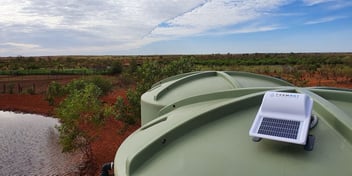Water from air and other innovative agritech solutions win 2020 Water Challenge
One innovation looks to create water from thin air. Another monitors New Zealand’s waterways in real time to maintain their quality. A third is using acoustic sensing to ensure more efficient irrigation.
These bright ideas — and more — have been identified by the agritech commercialisation partner Bridge Hub as winners of the company’s 2020 Water Challenge, which aimed to solve water problems in the agricultural supply chain.
Drawing entries from more than 150 participants, the challenge recognised achievements in research and start-up categories in Australia, New Zealand and in a start-up category for Israel.
The winners were announced by Bridge Hub today in a digital event.
Bridge Hub CEO Craig Shapiro said the company used water as the basis of its agrifood tech challenge because it was fundamental to the entire supply chain.
"That led to us looking to use a challenge to try and bring the ideas to us, rather than trying to cross the country to every research organisation, every entrepreneur whose got a great idea," he said.
"And to use it as an opportunity to bring together a bunch of people who really care about water and how we use it, and also to identify some opportunities for us to help researchers and entrepreneurs to commercialise their ideas and their research."
ACWA and digital treatment
University of Sydney Professor Chiara Neto’s Advanced Capture of Water from the Atmosphere (ACWA) team won the Challenge’s Australian Research Stream.
“We need new, alternative sources of water that provide water where it is needed,” Neto said.
“Our solution is new nanostructured coatings that capture water passively from the atmosphere through condensation. In order to work, these coatings only need to be exposed to the sky.”
The technology, Neto said, has no moving parts, requires no energy input, and can operate 24 hours a day.
“Because the volume of water collected is proportional to the surface area that does the collecting, we apply these coatings over large pre-existing surfaces, such as roofs or large tents,” she said.
“The collection efficiency is of the order of one litre of water per square metre of surface per day.”
Meanwhile, the winner of the Australian start-up stream was Streamwise DI, which uses artificial intelligence to improve wastewater solutions for food manufacturers, such as meat and dairy processors or cereal producers.
Produced by digital wastewater services company Waterwerx, the technology is a data-monitoring and automation management system that uses Internet of Things and machine learning to digitise he wastewater treatment process. That allows operators at treatment plants to better comply with regulation, as well as reduce costs and chemical dosing.
Watching the waterways
Winner of the New Zealand start-up stream was Riverwatch, a monitoring technology that uses robust and affordable sensors to democratise water quality monitoring so anyone from government officials to farmers and citizen scientists can engage with local waterways.
“Riverwatch is a water-quality monitor that tests for water quality in real time, sending all that data to the cloud, where our software converts that data to wisdom, said James Muir, founder and CTO of Riverwatch.
“What we’re about is connecting people to their waterways so they can manage water quality remotely and they can see what’s happening in their water in real time, so that we can understand how water quality changes over space and over time.”
The New Zealand research stream was won by AgResearch, which uses acoustic sensing to help irrigators prevent runoff and pollution.
Dr Chandra Ghimire of AgResearch said that the technology, SWAMI — or Soil Water Assessment and Migration for Irrigation — overcame problems of current sensors that are unable to measure soil surface condition during irrigation, potentially resulting in overland flow of contaminants to water bodies.
“Our sensor is a non-contact sensor that can sense the soil surface condition in real time during irrigation,” Ghimire said.
“It utilises acoustic technology to differentiate between water and soil in irrigation.”
Off-grid recycling
A decentralised wastewater treatment solution from Laguna Tech won the Isarel start-up stream.
“Most of the world does not have the ability to access the appropriate infrastructure to treat wastewater,” said Laguna Tech CEO Clive Lipchin. “This means that a lot of wastewater is being discharged untreated or partially treated either directly or indirectly into the environment, creating environmental and public health hazards.”
He pointed out that such untreated wastewater could not be used for agricultural purposes.
“Laguna Tech solves these problems by providing and off-grid, fully automated, compact zero-sludge solution to treating wastewater and recycling that wastewater to a high quality so it can be used safely and effectively in agricultural production,” Lipchn said.
Winners in Australia and New Zealand received cash prizes as well as the opportunity to receive an investment into the commercial outcome of their solution. The Israeli winner will have the opportunity to visit Australia to trial their technology.
Shapiro said that sustainability underpinned each of the winners' solutions, but they were notable for their diversity.
"We wanted diversity," he said. "Particularly when we're looking across the entire agrifood supply chain. A solution on-farm versus a solution for a food manufacturer looks really, really different. I think diversity is what we were hoping for, albeit knowing that it was going to make the job of picking the winners for each of the streams a little bit more challenging. We were looking for groundbreaking ideas."

